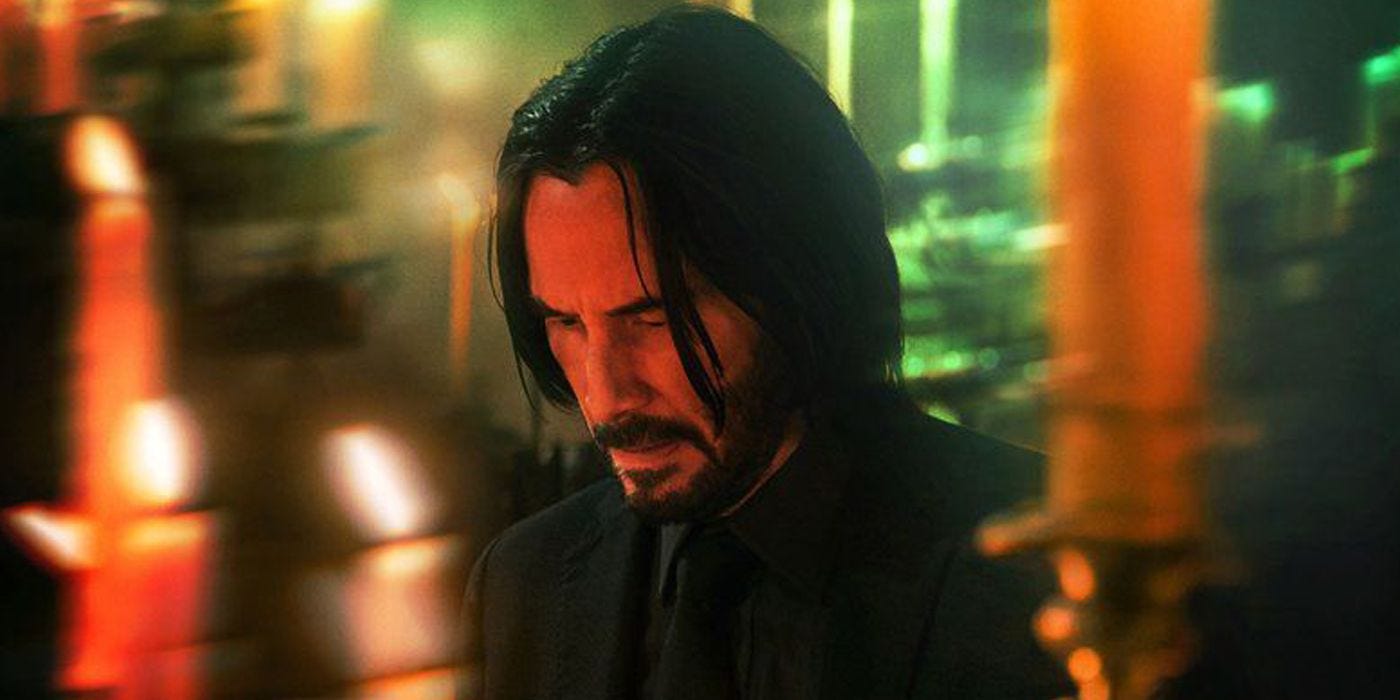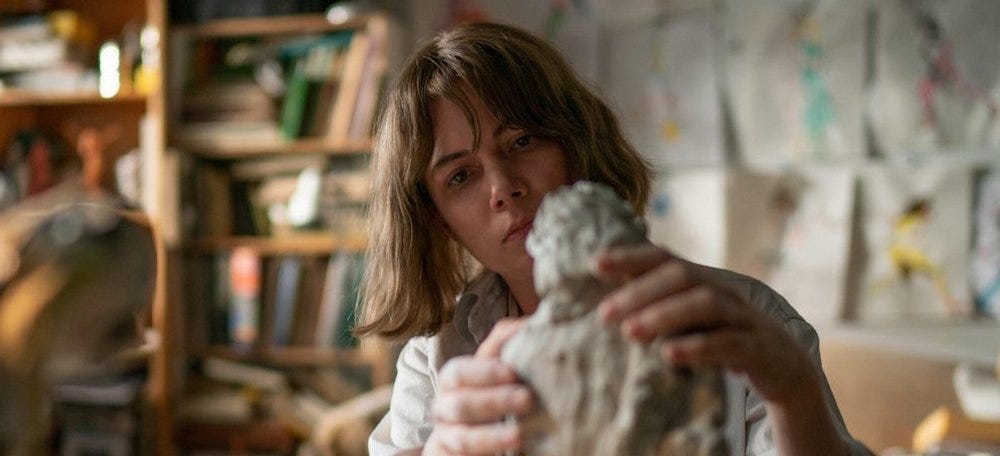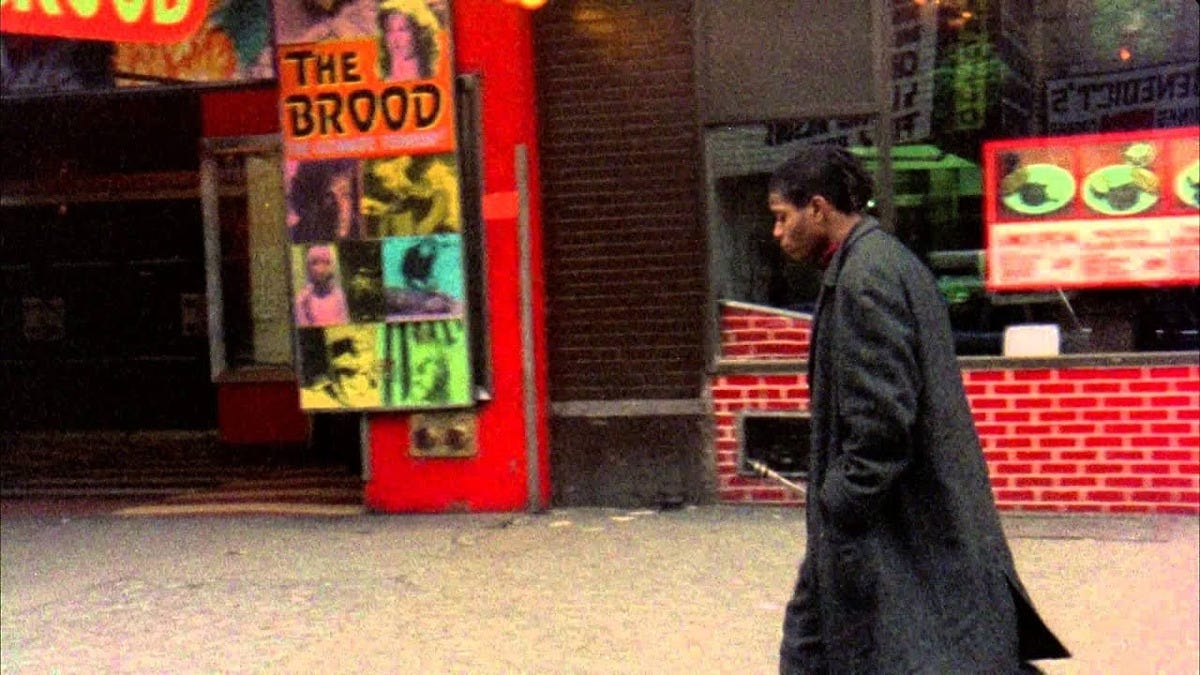#8: Are You Still Watching? John Wick: Chapter 4 & Showing Up 🎨
Our contributors and editor take on two recent releases for anyone feeling Tired Of It All.
Run Me Over, Johnny!
by Nancy Webb
John Wick sets a man on fire with a single gun blast. It’s not my usual flavour of entertainment. And yet, I find myself at 2pm on a Monday, sitting in an almost-empty megaplex theatre watching John Wick: Chapter 4 for the second time in a week.
I drive a Communauto downtown in the rain. I’ve been overrun by anxious thoughts lately. Almost nothing stops the barrage, except for Instagram Reels (make it illegal) and John Wick: Chapter 4. Is it because John Wick is, as my friend says, “the sensual person’s action franchise?”
It’s the only one I can bring myself to care about. The Marvel Cinematic Universe leaves me cold. To watch a Hemsworth wield a big hammer strikes me as banal—that’s just meat! A 58-year-old Keanu Reeves gliding through a sheet of bullets in a Japanese hotel that looks like it’s made of Fruit Roll-Ups? Now we’re talking. I want to be destroyed at a cellular level by a Justice track as John Wick revs a motorcycle in my face. Run me over, Johnny!
I find my seat in the near-empty theatre. The measured pounding of Wick’s fist against a bloody post instantly puts me at ease, slamming the intrusive thoughts out of my brain. Later comes infamous clown-boy Bill Skarsgård in French drag as the film’s central villain—Marquis Vincent de Gramont. He examines Delacroix’s Liberty Leading the People in his office (The Musée du Louvre) while eating an exquisite little patisserie with his mind. Everyone speaks exclusively in aphorisms, except for Wick, who says only: “Yeah.”
His “Yeah” is like a prayer. It’s the catch in the throat before tears. It’s the giving up and giving in. It’s what happens at the horizon line of language, when a word nearly evades classification as a fragment of meaning, slips into pure feeling—“Yeah.” And what else is there to say, really? When everything’s falling apart. When you’re an assassin who’s just tired. “Yeah.”
John Wick is no hero. His primary goal is to quit his job. He yearns only to be remembered as “Loving Husband”. He’s avenged the murder of his beagle, and now wants to live in an elysian, honey-dipped daydream where he kisses his dead wife for 1.5 seconds.
He stands atop a hotel in Osaka gazing at a cherry blossom tree, blood-red in the city lights. We read too much into his sorrowful eyes, his soft spot for dogs, the way he has the same tall sad-dad walk as Adam Driver at the end of Marriage Story. We want to believe in his goodness, but he’s objectively a killing machine. As the Marquis reminds him before their sunrise showdown at Sacré Coeur: “John Wick, the killer.”
What made John a killer? Wild, unruly grief? The system within which he’s trapped? We can’t forget that he’s required by his employer to kill 300 hench people per day and repeatedly shatter his spine jumping out of windows.
The catharsis of watching a man so bedraggled, so fucking over it, rally the shreds of his energy to ascend the 222 stairs of Montmartre, killing dozens of assassins like swatting flies, cannot be overstated. But it isn’t long before he gets kicked to the bottom, tumbling down every step and is forced to re-climb them. His old friend Caine (Donnie Yen), whose fate is entangled with John’s, shows up to encourage him: “I’m gonna need you to get to the top of those stairs, John”—a solid beat—“Yeah”.
Pretty much the entire film takes place at sunrise or sundown. When it’s not golden hour, it’s a festival of neon and flashing lights. I’ve always considered midday a danger to my emotional wellbeing. 11am has a violence to it, and 3pm could literally kill you. Sitting in the darkened theatre, laughing alongside eight strangers when rogue assassin Mr. Nobody (Shamier Anderson)’s dog pees on an assassin’s head, I’m safe in the knowledge that these harrowing midday hours are running their course while I’m getting my—pardon my language—ass blasted by this absolute Wickfest.
There’s really no time for rumination when you’re globetrotting from New York, to Morocco, to Berlin, to Paris. When you’re made to feel microscopic in front of the facades of The Alte Nationalgalerie, or the National Art Center in Tokyo, the Brandenburg Gate or the Arc de Triomphe. I’ve been told to try exercise, mindfulness, touching a tree, but nothing overrides the amygdala like Rina Sawayama in an incredible outfit climbing a henchman like a frozen mountain with two ice picks for hands.
The film’s final showdown feels like an encroaching hangover. Everyone’s tired. Everyone’s full of bullets. Parisian daybreak drenches everyone in a heavenly, sinister yellow glow. It’s at this moment, roughly two hours and thirty minutes in, that I begin to feel bored for the first time, but also sad that it’s going to end. I’m the speck of melancholy in John Wick’s iris, which reflects the streets of Paris, where people are beginning their days, sipping their coffee, eating their croissants. John and I both know we’ll never get to relax. But just for a few sacred hours in the theatre? Yeah.
Nancy Webb is a writer and Keanu Reeves fan who lives in Montreal.
Showing Up (2023)
by Sennah Yee
Listen, if I didn’t have to do this, I wouldn’t—would I? Sitting at my laptop, dangling a carrot in front of myself, self-hypnosis. I don’t know much, but I do know that when I don’t know how to properly express a feeling—like that I’m so much smaller, yet smarter, than this, than that—it’s agony. Looking up a rival who doesn’t know I exist, just existing. Looking up the Greek roots of “agony” and it comes from “struggle,” but also “contest.” Picking at a wound, self-inflicted, while it’s self-healing. Picking at a poem, like this one, that should already be done.
Sennah Yee is the author of How Do I Look? and My Day With Gong Gong.
Feeling Uneasy? MLA Chernoff recommends Downtown 81 (2000):
DREAM, BABY, DREAM (A-TONE FOR UNEASE)
Unease has always been horny for me—it Zooms me sweet something-or-others in my sleep. It’s fine, really, but the stark-dark look on my alone-time face can get as glacial as a pixel in a manic dream. It is during these moments of unhumble, derealized reconnaissance that I am inclined to Google myself in one tab, and Google my history in the other. And that’s how this visitation begins—pick a mood: you know The Thing. Pick a film: Blondie, mommy, mimesis, and me.
I first watched Downtown 81 as a hypervigilant teen with too much unacknowledged trauma and no disposition to art appreciation. Stylization was a void I could pretend to squish, thumb-to-pointer, from the far of my eye. After sucking down a mislabelled Limewire file containing a song by Teenage Jesus and the Jerks (I expected, idk, RHCP?), I did a little research. Eventually, I stumbled upon a YouTube link to the film, cut into ten segments; this led to a teased-out mess of curiosities. Why is the acting so jarring? How does Arto Lindsay make his guitar sound like fractured wrists, windblown through the busted bustles of Wall Street, early morning? How is all this noise so enjoyable, cathartic? How could there be “No Wave”? What’s wrong with New Wave? Nothing, unless…
Ultimately, Downtown 81—originally titled New York Beat Movie—is a laconic document of a yet-to-be-gentrified New York City, brimming with struggling artists. The protagonist, Jean-Michel Basquiat, was quite literally unhoused during its filming—this quickly changes, over the course of the plot and his actual tragically brief life as creative vanguard. And that’s precisely what’s so unnerving and beautiful about this movie: it’s a radical (mis)representation and romanticization of a desolate city spewing impossible soundscapes, a blip in time where outsider artistry could mutate survival into clout-y, clouded affluence, and often did. These are easy tropes, common and boring, but always dangerous—a post-punk fairy-tale, atonal and wonderous.
With no access to therapy, the childishness of my teenage being could only respond to its awful circumstances with noise—tune out, turn off, and tune out some more, just in case. Basquiat’s loud, sensuous journey to find housing in the film unwittingly birthed a kind of false hope inside of me, both naïve and neoliberal. The hipped-up grit of it all was so compelling, but so too was the prospect of monetizing it. Maybe I’ll survive—and why not make it art. For many years, I lived vicariously through the sonic intensities of a long-lost Lower East Side—and that’s just fine; it’s still nice to visit your problematic faves, to open yourself to old ideologies, even ones you no longer want or need. If you feel like the shell of a person, why not wander with Jean-Michel for a while? Watch him thrive and love a while? No doubt, it’s okay to scream a little, but Downtown 81 is here to help you dream a little, to lull you to sleep and stroke your mask-covered face while you rest your uneasy head after the rally.
MLA Chernoff is a Toronto-based poet, performance artist, meme enthusiast, and recovering academic.
Wondering what to watch?
Choose a mood on our Film Recommendation Generator and get a curated pick from writers, filmmakers, poets, and artists.
Donate
If you’d like to donate to our mag you can do so through our PayPal! We’re volunteer-run, and donations go directly to the mag and contributor honorariums.









